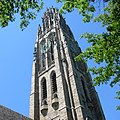 Yale Journal of International Law cover | |
| Discipline | Law |
|---|---|
| Language | English |
| Edited by | Varun Char, Jessica Laird |
| Publication details | |
| History | 1974-present |
| Publisher | |
| Frequency | Biannual |
| Standard abbreviations | |
| Bluebook | Yale J. Int'l L. |
| ISO 4 | Yale J. Int. Law |
| Indexing | |
| ISSN | 0889-7743 |
| LCCN | 86642406 |
| OCLC no. | 12626339 |
| Links | |
The Yale Journal of International Law is a student-edited international law review at the Yale Law School (New Haven, Connecticut). The journal publishes articles on a range of topics in international and comparative law.

